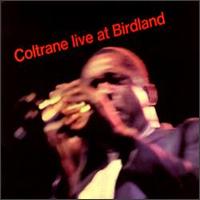Live at Birdland (stylized on the cover as Coltrane live at Birdland) is an album by the jazz saxophonist and composer John Coltrane. It was released on January 9, 1964 through Impulse! Records.[1][2][3] Three of its tracks were recorded live at the Birdland club and two are studio recordings. Among them is "Alabama", a tribute to four black children killed in the 16th Street Baptist Church bombing, a white supremacist terrorist attack in Birmingham, Alabama.
| Live at Birdland | ||||
|---|---|---|---|---|
 | ||||
| Studio album / Live album by | ||||
| Released | January 9, 1964[1][2] | |||
| Recorded | October 8, 1963 (#1–3) March 6, 1963 (#6, CD only) November 18, 1963 (#4–5) | |||
| Venue | Birdland, New York City (#1–3) | |||
| Studio | Van Gelder (Englewood Cliffs) (#4–5) | |||
| Genre | Jazz, post-bop | |||
| Length | 38:54 original LP 43:35 CD reissue | |||
| Label | Impulse! A-50 | |||
| Producer | Bob Thiele | |||
| John Coltrane chronology | ||||
| ||||
The album's original pressing accidentally included a false start–– this was corrected in later copies, but restored in CD editions. The album also features a live recording of "I Want to Talk About You", a song Coltrane had recorded on his 1958 album Soultrane, this time with an extended cadenza.
| Review scores | |
|---|---|
| Source | Rating |
| AllMusic | |
| The Penguin Guide to Jazz | |
| Record Mirror | |
| The Rolling Stone Jazz Record Guide | |
Reception
editScott Yanow's five-star AllMusic review calls the recording "[a]rguably John Coltrane's finest all-around album".[4] A review in All About Jazz states: "Coltrane Live at Birdland showcases 'The Great Quartet' in excellent form: Elvin banging and cursin', McCoy a steady force maintaining the form, Jimmy Garrison pacing the beat and Coltrane stretching out into space filling the void... A definite collectors' item."[8] Reviewer C. Michael Bailey wrote: "If the listener wishes to hear the master in transition, look no further than Coltrane Live at Birdland."[3] LeRoi Jones wrote: "There is a daringly human quality to John Coltrane's music that makes itself felt, wherever he records. If you can hear, this music will make you think of a lot of weird and wonderful things. You might even become one of them."[9] In 2017, Pitchfork ranked the album as the 128th best of the 1960s.[10]
Regarding the track "Alabama", Ben Ratliff wrote: "It is a striking piece of music. If anyone wants to begin to understand how Coltrane could inspire so much awe so quickly, the reason is probably inside "Alabama". The incantational tumult he could raise in a long improvisation, the steel-trap knowledge of harmony, the writing—that's all very impressive. But "Alabama" is also an accurate psychological portrait of a time, a complicated mood that nobody else could render so well."[11]
Track listing
editAll songs written by John Coltrane except as indicated
- "Afro Blue" (Mongo Santamaria) – 10:50
- "I Want to Talk About You" (Billy Eckstine) – 8:11
- "The Promise" – 8:10
- "Alabama" – 5:09
- "Your Lady" – 6:39
- Compact Disc bonus track
- "Vilia" (Franz Lehár) – 4:36
"Vilia" is a jazz arrangement of Franz Lehár's "Es lebt' eine Vilja, ein Waldmägdelein" from The Merry Widow. This track was first released on a 1965 compilation by Impulse![12]
Personnel
editReferences
edit- ^ a b DeVito, Chris; Fujioka, Yasuhiro; Schmaler, Wolf; Wild, David (2013). Porter, Lewis (ed.). The John Coltrane Reference. New York/Abingdon: Routledge. p. 689. ISBN 9780415634632.
- ^ a b Ostrow, Marty; Howard, Ira; Lichtman, Irv, eds. (January 18, 1964). "ABC-Par's 33 New Albums Is a Record-setting Issue" (PDF). Cash Box. New York: The Cash Box Publishing Co. p. 9. Archived (PDF) from the original on Oct 8, 2022.
- ^ a b Bailey, C. Michael. "John Coltrane: Live At Birdland". All About Jazz. Archived from the original on 6 August 2015. Retrieved 30 May 2019.
- ^ a b Yanow, Scott. "John Coltrane Live at Birdland". AllMusic. Retrieved October 1, 2020.
- ^ Cook, Richard; Morton, Brian (2008). The Penguin Guide to Jazz Recordings (9th ed.). Penguin. p. 289. ISBN 978-0-141-03401-0.
- ^ "John Coltrane: Live At Birdland" (PDF). Record Mirror. No. 176. 25 July 1964. p. 9. Archived from the original (PDF) on 2022-07-15. Retrieved 15 August 2022.
- ^ Swenson, J., ed. (1985). The Rolling Stone Jazz Record Guide. USA: Random House/Rolling Stone. p. 47. ISBN 0-394-72643-X.
- ^ "John Coltrane: Coltrane Live at Birdland". All About Jazz. June 1, 1997. Retrieved October 1, 2020.
- ^ Jones, LeRoi (2010). Black Music. Akashi Classics. p. 66.
- ^ "The 200 Best Albums of the 1960s: 140-121". Pitchfork. 22 August 2017. Archived from the original on 22 August 2017. Retrieved 24 March 2023.
- ^ Ratliff, Ben (2007). Coltrane: The Story of a Sound. Farrar, Straus and Giroux. p. 86.
- ^ "The Definitive Jazz Scene Volume 3 (1965, Vinyl)". Discogs.